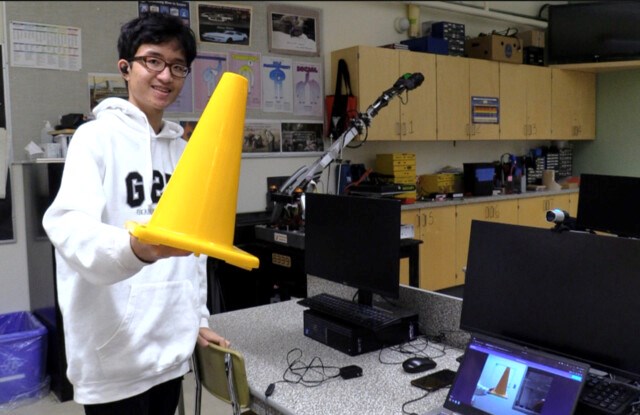A small but mighty team built up of technology-loving South Okanagan high school students are working hard to get to a prestigious national robotics competition, but they need help to get there.
The Penticton Robotics Team has ten students from Penticton Secondary School, Princess Margaret Secondary School, and Summerland Secondary.
The after-school club, which is run by Princess Margaret's school teacher Josh Walker, is an opportunity for the students to learn all the science, technology, engineering, and mathematics (STEM) principles in a much more targeted fashion than they would in the school.
“They build every part of that robot. They know all of the systems and if something goes wrong, they're the ones who fix it, I'm not going to be there. I will be the mentor on the side who can give suggestions,” Walker said.
"The students fundraise, the students call companies, the students make application letters, they apply for grants, scholarships, and they arranged their own team, far more than say I would with my own electronics class. They're involved in every aspect of running the team."
The team is working up to the , which sees teams of 14 to 18-year-olds from around the region compete in Victoria with their robots in March, creating a robot responding to the yet-to-be-announced challenge.
Taylor Gordon, the build lead for the team, said that once they get their challenge announcement in January for what they need to build, they'll be meeting after school every day, for between five to six hours.
"So we find out again on the sixth of January of what we have to do. Until then it's continuing to fundraise to pay for the trip and working on the skill building needed to build this," he added.
With under two months to get ready, it's all hands on deck.
"[We] go to Victoria at the end of the build season to compete against a bunch of other teams to kind of see who has the best engineering or best design principles that went into their bot."
After joining the team two years ago, Gordon, now in grade 11, said he's learned how to use pneumatic pistons, how power distribution panels work, how to wire motors in series, and how wireless communication works, along with engineering principles.
To be able to travel to Victoria in early March and compete, the team is looking to raise around $20,000. Entry for the competition alone costs over $8,000, and then the team can spend a max of $5,000 on their robot.
"For us as a team, it's a great community. We get to meet a lot of really awesome people in Victoria last year, we had teams from the US come we had teams from Hawaii, Chinese Taipei, we even had a team from Australia," Gordon said. "It's all really like minded people."
Team Lead Scarlett Steyn said their main goal is education, challenging themselves and the other members in the club to explore interest in education in robotics, engineering, business, marketing and fundraising.
"We try our best here. I've seen robots that are fully automatic, but I know that we do the most education we possibly can here and that's what matters most to me," she added.
One of her teammates dove into AI coding and got help with a professor from Ontario for education. He's now built a program that helps recognize a traffic cone, which was one of the main parts of the challenges last year.
"What's unique about this program, unlike other programs, we design and build it from the ground up. We get to this design, the plans everything. We get the steel, we get the aluminum, we build it all up, we order the parts we need. It's all by hand," Steyn said.
Aside from sponsorships and donations, the team is also looking for mentors, whether it's someone who can help out with a single lesson or join their team entirely.
"I would love for somebody to come alongside and help with the fundraising, because that's not my thing. I'm great with the build, I'm great with the design, I can sort of look at the code and go, 'Yeah, that might work that might not,'" Walker said.
"[We're] looking for people to say mentor the team on a one off basis, maybe they come in and they're an engineer, and they can look at our plans and say, give us some feedback on that. Maybe they can look at our code, and give us some feedback on how to make it more efficient."
Walker hopes his students will get as much as they can out of the program and competition as possible.
"I want this to be a springboard that they can use to grow a career out of. A lot of them do make career changes, after having done this," he added.
"They do some really good work, they put in some long hours. And at the end of the day, it's exciting to see where they go with this. It's really exciting."
Gordon said for him, the biggest goal with the team is not necessarily to come out in first place.
"It's to show that even a small [program] in Penticton is able to do something of this scale and actually be competitive with it...just because you're from a small town, doesn't mean you can't do things like these."
The team is also always looking for new members to join their club.
If you're interested in joining, mentoring the club, donation or sponsorship, email [email protected] or head to the




